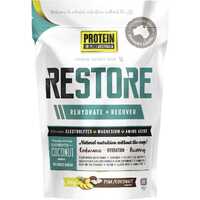When it comes to making the most of your training plan, chances are you think the more often you hit the gym, the better. After all, it’s a steady stream of effort that yields great results, right?
True.
But, it’s also a steady stream of rest that does as well.
You might be scratching your head wondering how that can be. How can both work and rest yield results?
As it turns out, rest is just as important as those intense workouts that you've committed to. Sure, you may not need equal amounts of each and work should come at a higher frequency than rest days, but rest must be in there nevertheless.
Let’s look at the many reasons why rest days are so critical.
Rest Days Are When You Progress
One big error in most people’s thinking is that rest days are days you won’t make progress. Wrong. In fact, rest days are when you do make progress.
The thing to remember here is that when you’re in the gym, you’re actually breaking lean muscle mass tissue down. In a sense, you’re getting weaker. If you ever tried to do the lift that you started your workout with at the end, you’d definitely fail because you’re in a fatigued state.
It’s during the rest day that the body gets a chance to really repair the damage that was done to the tissue and begin growing back stronger than it ever was before.
If you skip over these rest days entirely, how do you expect that to happen? It won’t. Instead, you’ll slowly begin to see a decline in performance until you’re much weaker than you were before.
Rest Days Rejuvenate The Mind
The second reason why rest days are important is because they refresh your mind. It can be psychologically draining hitting the gym day after day and always giving 110%.
As time goes on, this mental effort begins to wear on you. Soon, you aren’t as motivated as you normally are. Take a rest day or two (or even three!) and you’ll be raring to go when you get back into the gym.
Half of hitting those PR’s (personal records) in the gym is the mental drive and push you have during that lift. If that mental drive isn’t there, results aren’t going to be coming your way.
Rest Weeks Heal Nagging Injuries
Another great thing about rest periods is that they’re a time for healing those nagging injuries that are starting to occur. Now this may not occur over a simple rest day, but if you take a rest week for instance – a short period of time away from the gym, this can often be enough to heal all those tiny microtears in the ligaments and tendons that would otherwise eventually go on to become serious injuries.
We’ve all been there. That nagging injury that just won’t let up. One day it’ll feel okay and the next, you have that hint of pain. It never becomes enough to completely take you out of training (or it hasn’t yet), but it never feels good either. As such, it’s limiting your progress.
Eventually though, if not given time to heal, this injury will take you out entirely. Then you will be forced to rest and chances are, you’ll be doing a lot more rest than you had originally planned on doing.
By taking that week off to recover, you can avoid this entirely and feel better the entire time you’re working out as well. Many people undervalue rest weeks. They can make a huge difference over your training career.
Rest Phases Resensitize The Body
Finally, the last benefit of rest that is often overlooked is that it can help to resensitize the body. What do we mean by this?
If your goal is hypertrophy for example, you need progressive overload to make progress. Each week you go into the gym, you need to do more than last week in order to see continued muscle growth.
Eventually though, there will come a time when the total amount of work you are doing exceeds what you are able to recover from. This is when overtraining sets in and you stop making progress.
By taking a full month off – not necessarily resting, but changing the nature of your training (say, switching to strength work using lower rep ranges), you’ll help to resensitize those tissues so that the next time you move into a hypertrophy phase again, the body begins to respond.
Now you can begin that hypertrophy phase using a lower volume of training and slowly building up again until you’re at the point where you’ve hit your maximum recoverable volume. Upon which, it’s time to repeat the process once again.
The same principle applies with fat loss as well. If you diet and exercise hard for months on end, eventually you hit a plateau and your body stops responding. The only way to get things moving again is to take a short-term break to let the body get back to baseline levels and begin again.
So there you have it, there are quite a few beneficial reasons that emphasise the importance of rest days and even weeks. So it's time you stop overlooking the value of rest in your training program, every good and well-thought out program should have rest periods scheduled in.
...and remember, qualified nutritionists at Healthy Being are available to offer further general advice to help guide you in selecting the right products. So please, feel free to contact us us at any time!
 Dr Peter Succar heads up the Product Research Team at Healthy Being and is an enthusiastic Health & Fitness Lifestyle Coach. He's passionate about helping others obtain optimum health, advocating realistic and achievable changes in diets and lifestyles that promote the body’s natural immunity, its ability to self-heal and achieve overall mental and physical well-being.
Dr Peter Succar heads up the Product Research Team at Healthy Being and is an enthusiastic Health & Fitness Lifestyle Coach. He's passionate about helping others obtain optimum health, advocating realistic and achievable changes in diets and lifestyles that promote the body’s natural immunity, its ability to self-heal and achieve overall mental and physical well-being.


 Certified Organic
Certified Organic Vegan Friendly
Vegan Friendly  Vegetarian
Vegetarian Organic Ingredients
Organic Ingredients Dairy Free
Dairy Free Gluten Free
Gluten Free Keto Friendly
Keto Friendly






























